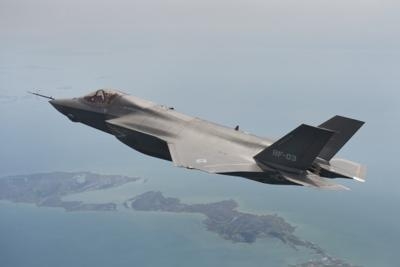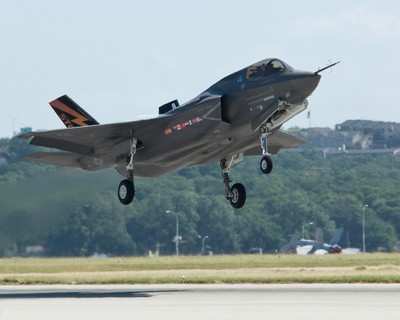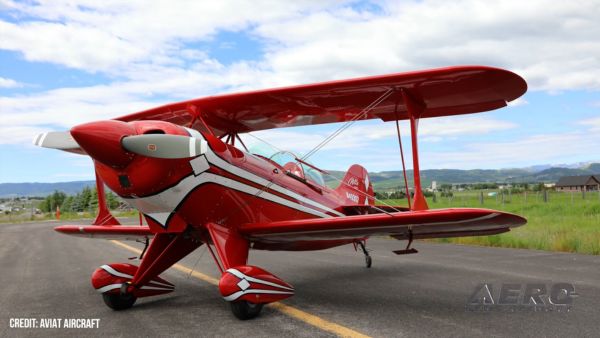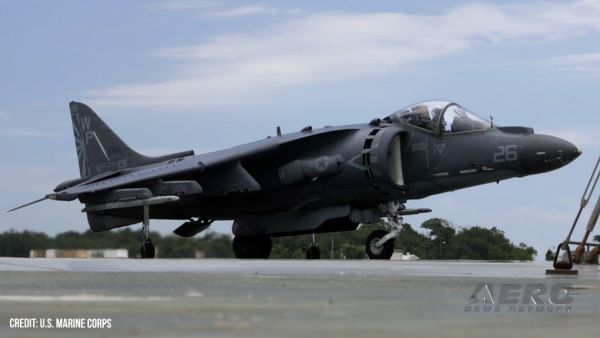Thu, Sep 06, 2012
BF-2 Made 27 Successful Air Starts Last Month
The F-35 integrated test force announced the completion of a major prerequisite test for in-flight performance on the short take-off and vertical landing variant of the F-35 Lightning II Joint Strike Fighter September 4.

BF-2 completed the first air starts, which test the ability of the F-35's propulsion system to restart during flight. Verifying the restart capability of the propulsion system is part of the initial flight test program for the F-35 and a prerequisite for high angle-of-attack testing, scheduled to start next year.
"High alpha, or angle-of-attack tests, are important for us to fully evaluate the aircraft's handling characteristics and warfighting capability," said Marine Corps test pilot Lt. Col. Matthew Kelly. "Maximizing the performance of the airplane around the very slow edges of the flight envelope is probably some of the most challenging testing we will conduct. After we get through it, we'll know a lot more about how this aircraft will perform during combat within visual range."
Using multiple restart methods during the tests, BF-2 successfully completed a series of 27 air starts at various altitudes August 15. To execute air start testing, the F-35 Integrated Test Force (ITF) at Naval Air Station Patuxent River in Maryland ferried BF-2 and an F/A-18 chase aircraft from Air Test and Evaluation Squadron (VX) 23 to the F-35A testing facility at Edwards AFB.
"At Edwards, we have a unique testing range, which provides ideal and controlled conditions for completing air start testing. The Edwards range is comprised of 20,000 square miles of airspace, and has 65 linear miles of useable landing area on Rogers and Rosamond Dry Lakes, if required during engine out testing," said Lt. Col. George N. Schwartz, commander of the 461st Flight Test Squadron and government site director. "In addition, we've recently completed air start testing on the F-35A, so we're able to share some of our expertise with the Pax team as well."

The core of the F-35B's propulsion system is the F135 engine, capable of more than 40,000 pounds of thrust. "The F135 continues to power a successful flight test program," said Roy Hauck, Pratt & Whitney site lead at the F-35 Patuxent River ITF. "The aircraft and its integrated systems demonstrated intentional flameout and successful recovery scenarios during air start flight tests, and BF-2 and the team did a great job."
A team of approximately 60 ITF and VX-23 personnel provided engineering and maintenance requirements for the events. The detachment to Edwards from NAS Patuxent River overlapped with a busy summer flight testing schedule.
"In the past two months, we've sent detachments to Edwards and Lakehurst (NJ) and maintained a full-tempo test schedule here," said Navy Capt. Erik Etz, director of test for F-35 naval variants at NAS Patuxent River. "The team of military, government and industry personnel rallied to make all the events happen, and they can be proud of their accomplishments."
(F-35B images from file)
More News
No Gyro Approach A radar approach/vector provided in case of a malfunctioning gyro-compass or directional gyro. Instead of providing the pilot with headings to be flown, the contro>[...]
Aero Linx: European Hang Gliding and Paragliding Union (EHPU) The general aim of the EHPU is to promote and protect hang gliding and paragliding in Europe. In order to achieve this>[...]
Make Sure You NEVER Miss A New Story From Aero-News Network Do you ever feel like you never see posts from a certain person or page on Facebook or Instagram? Here’s how you c>[...]
Also: Duffy Wants $$$, KS Airports, Morningside U’s Aviation School, New Airstrip In ID After 6 were killed in a helicopter crash over the Hudson River, several US Representa>[...]
Also: Hermeus Quarterhorse MK1, Seaplane Rating Guide, Vietjet A330neos, SFO Wacky Weed Bust As the air traffic controller shortage trudges on, the US Department of Transportation >[...]
 ANN's Daily Aero-Term (06.03.25): No Gyro Approach
ANN's Daily Aero-Term (06.03.25): No Gyro Approach ANN's Daily Aero-Linx (06.03.25)
ANN's Daily Aero-Linx (06.03.25) ANN FAQ: Turn On Post Notifications
ANN FAQ: Turn On Post Notifications Airborne 05.30.25: Anti-Helicopter Bill, PW Strike Done, All-Electric Bristell
Airborne 05.30.25: Anti-Helicopter Bill, PW Strike Done, All-Electric Bristell Airborne 05.29.25: ATC Bonu$, VX4 eVTOL Flies, Starship 9 Test
Airborne 05.29.25: ATC Bonu$, VX4 eVTOL Flies, Starship 9 Test




